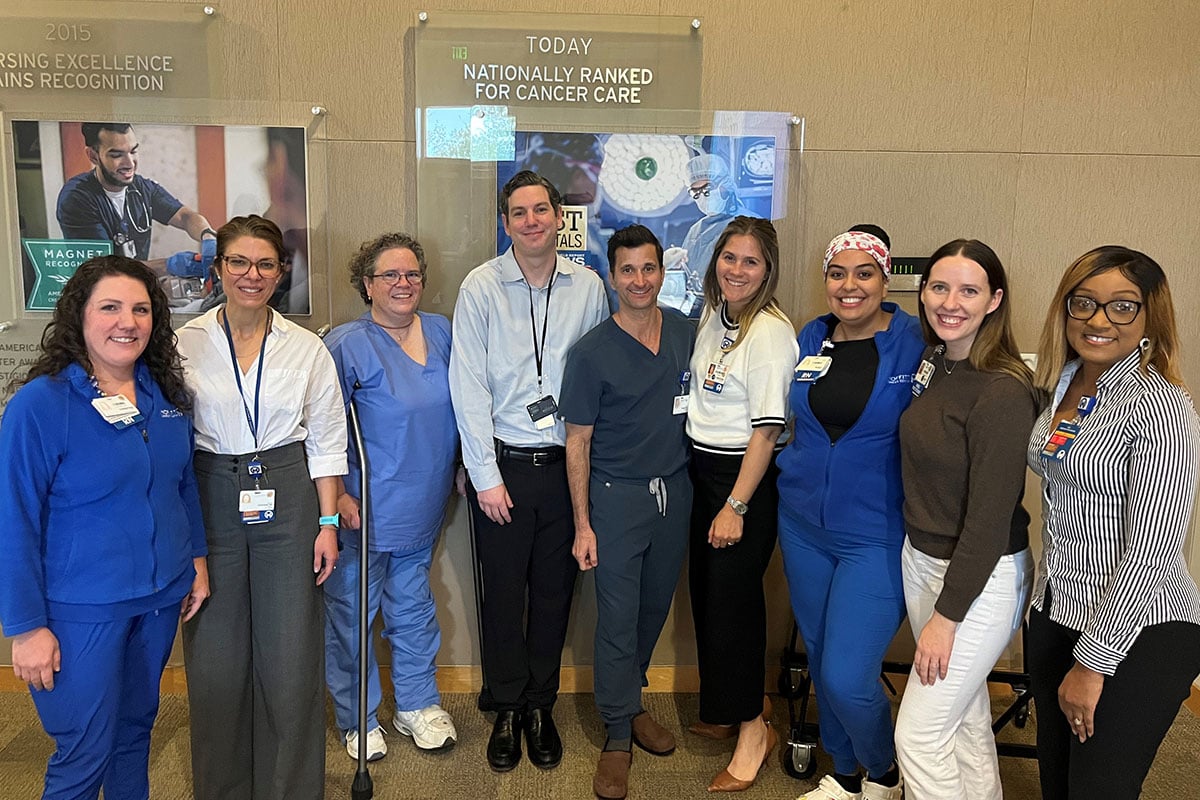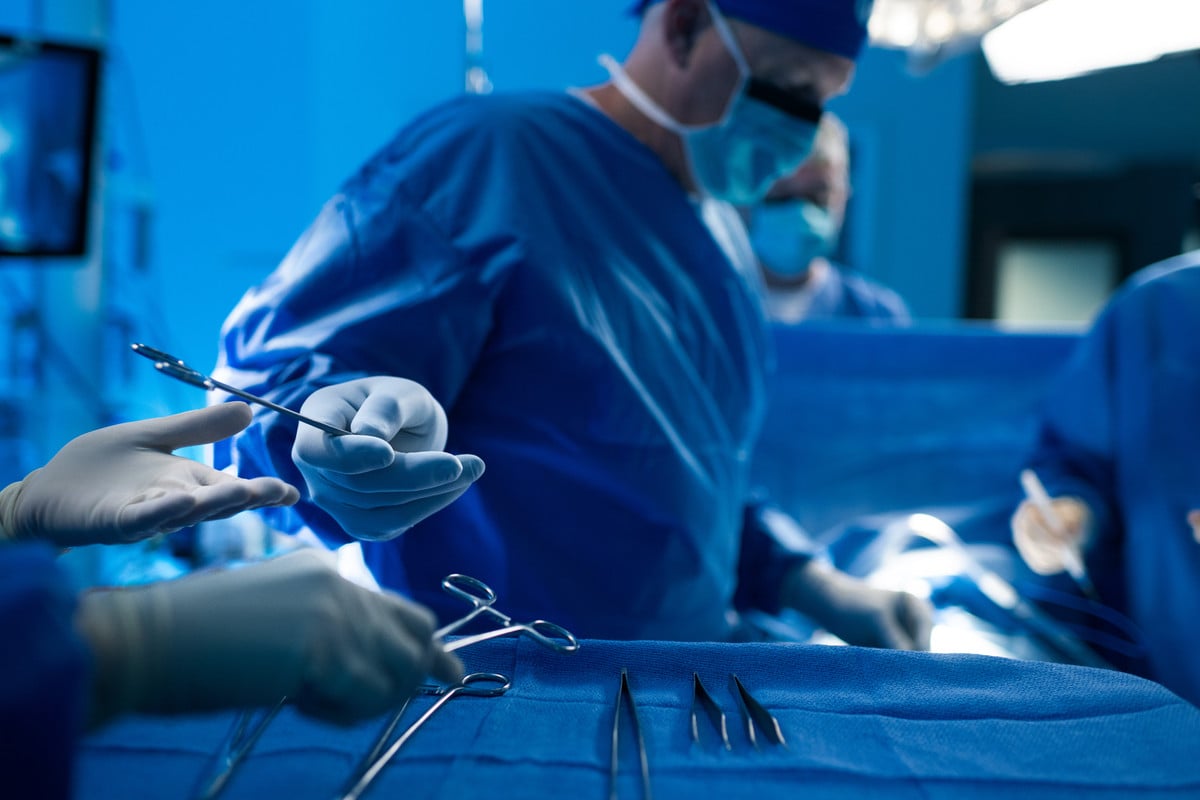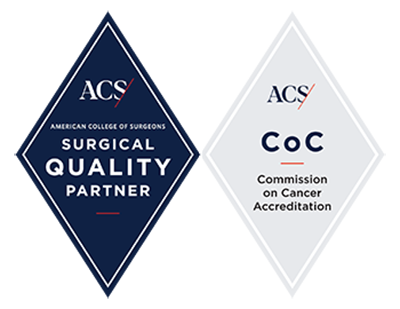Colon Cancer Surgery
Colon cancer begins in the inner lining of the large intestine, often developing from benign polyps that progress and become cancerous over time. This gradual process can take up to several years or even longer. Like many other types of cancer, colon cancer results from harmful cellular DNA changes, which are sometimes passed from parent to child. Although the precise cause is not well understood, tumor growth may be driven by certain risk factors, including a diet high in red meat, physical inactivity, smoking and obesity.
Early-stage colon cancer is often asymptomatic. As the tumor grows, it may begin to cause noticeable changes in bowel habits, abdominal discomfort, blood in the stool, weight loss and fatigue. Regular screening tests, such as routine colonoscopies, are highly effective and play a key role in the early detection of colon cancer, significantly improving outcomes by enabling physicians to remove precancerous colon polyps before they evolve into cancer.
Colon cancer primarily affects older adults, particularly those over 50, and remains one of the most common cancers worldwide. When localized to the bowel, it is highly treatable and often curable with surgery. Although the terms “colon cancer surgery” and “colorectal cancer surgery” are often used interchangeably, there are some key differences. Colon cancer develops in the colon—the main part of the large intestine—while rectal cancer arises in the rectum, the final section before the anus. Therefore, the two conditions often require different surgical treatment approaches.

Get an Appointment in One Week*
Call 888-663-3488Types of colon cancer surgery
Colon cancer surgery is a personalized treatment designed to effectively remove cancerous tissue while preserving as much normal bowel function as possible. The optimal surgical technique can vary depending on several unique factors, including the type, location and stage of the tumor and the patient’s overall health. Understanding the options can empower the patient to have informed discussions with their healthcare team about the best treatment strategy, which may include:
Partial colectomy for colon cancer
Also known as segmental colectomy, partial colectomy involves removing the cancerous section of the colon along with a slim margin of surrounding healthy tissue and some nearby lymph nodes. This procedure may be considered for removing a localized tumor, aiming to eliminate the cancer while preserving normal bowel function. After removing the tumor, the surgeon will reattach the remaining ends of the colon to restore the continuity of the digestive tract. Widely viewed as the standard treatment for many cases of colon cancer, partial colectomy can lead to a favorable recovery time and long-term outcome.
Laparoscopic colectomy for colon cancer
Laparoscopic colectomy is a minimally invasive procedure in which the surgeon makes several small incisions to insert a miniature camera, light source and specialized surgical instruments. Using real-time imaging for guidance, the surgeon will precisely remove the tumor-bearing segment of the colon. Compared to open surgery, this approach can result in less postoperative pain, minimal scarring and a faster recovery. For a patient who is a suitable candidate for minimally invasive surgery, laparoscopic colectomy can enable a quick return to daily activities while maintaining effective cancer treatment.
Robotic-assisted colectomy for colon cancer
Robotic-assisted colectomy builds on the principles of laparoscopic colectomy by incorporating robotic technology to enhance the surgeon’s precision and control. While operating, the surgeon will use an advanced robotic system, such as the da Vinci Surgical System, to control tiny surgical instruments inside the patient’s body. In real time, the system will mimic the surgeon’s hand movements with a high level of refinement. The robotic system will also provide high-definition, three-dimensional (3D) views of the surgical site, helping the surgeon navigate complex anatomical structures safely. Robotic surgery may be ideal for an intricate colon cancer case, where enhanced dexterity and visualization can greatly reduce the risk of complications and improve the surgical outcome.
Open colectomy for colon cancer
Open colectomy is the traditional surgical treatment approach for colon cancer. The procedure involves making a large incision in the abdomen to access the colon directly. This technique allows the surgeon to manually examine and remove the cancerous portion of the colon along with the adjacent lymph nodes, ensuring thorough cancer removal. Although open colectomy typically results in a longer recovery period and more postoperative discomfort than minimally invasive surgery, it may be the optimal treatment approach if the tumor is extensive or previous surgery or other factors limit the feasibility of less invasive methods.
Total colectomy for colon cancer
Total colectomy involves the complete removal of the colon. This procedure is generally reserved for patients with widespread cancer or a genetic condition that predisposes them to multiple colon tumors, such as familial adenomatous polyposis (FAP). This extensive surgery aims to prevent further cancer development by removing the entire colon. Following total colectomy, the surgeon may perform an ileorectal anastomosis to connect the small intestine to the rectum or create an opening in the abdomen (ileostomy) to facilitate the passage of digestive waste.
Cytoreductive surgery with HIPEC for colon cancer
Cytoreductive surgery combined with hyperthermic intraperitoneal chemotherapy is a specialized, two-step treatment that may be considered if colon cancer has spread to the membrane lining the abdominal cavity (peritoneum). After the surgeon removes any visible tumors, a heated chemotherapy solution will be circulated throughout the abdomen. The goal of HIPEC is to target any remaining microscopic cancer cells, reducing the risk of recurrence and potentially improving the long-term outcome. An important option in comprehensive cancer care, this aggressive treatment may offer hope to a patient with advanced colon cancer.


Rated High Performing in Colon Cancer Surgery
Schedule an AppointmentWhat to expect before, during and after colon cancer surgery
In the days leading up to colon cancer surgery, the patient may understandably feel a bit apprehensive. Understanding the procedure can help ease any concerns and ensure readiness for each step of the journey. From preoperative preparations to the recovery period, being fully informed about the process can empower the patient to participate actively in their care and promote a smooth transition through each phase of treatment.
How to prepare for colon cancer surgery
Surgical preparation begins well before the patient arrives at the surgery center. Typically, the surgeon will request several preoperative consultations and evaluations to assess the patient’s overall health as well as the specifics of their colon cancer. During these sessions, the surgeon will review the patient’s medical history, go over the imaging and lab results, determine the most suitable surgical approach and plan the procedure. Additionally, the patient will receive detailed instructions regarding anesthesia, including what to expect and how to prepare.
Starting the day before surgery, the patient may be instructed to undergo bowel preparation, which typically involves following a specific diet and using prescribed laxatives or enemas to clear the colon. This step is crucial for reducing the risk of infection and ensuring the surgeon will have an unobstructed view of the surgical site.
Before heading to the surgery center, the patient should pack a small bag with some essential items, such as a change of clothes, personal toiletries, necessary medications and a list of any remaining questions for the healthcare team. Having these items ready can reduce stress and help the patient feel more comfortable on the day of the procedure.
What happens during colon cancer surgery?
On the day of colon cancer surgery, the patient will be greeted by a team of dedicated healthcare professionals who will prioritize the patient’s comfort and safety. After checking in and changing into a surgical gown, the patient will be escorted to a preoperative area where their vital signs will be monitored and the surgeon will go over the final details of the procedure.
Once in the operating room, the surgical team will administer anesthesia to ensure the patient remains comfortable and pain-free throughout the surgery. While the specifics of the procedure can vary based on the chosen surgical technique, the process will generally involve carefully removing the affected section of the colon and some nearby tissues and lymph nodes. Modern surgical techniques—whether laparoscopic, robotic-assisted or open—are designed to minimize trauma to the body and promote fast healing. Throughout the procedure, the healthcare team will continually monitor the patient while following advanced safety protocols.
What to expect after colon cancer surgery
When the surgery is complete, the patient will be moved to a recovery area where their vital signs will be monitored as they begin to wake from the anesthesia. The length of the hospital stay can vary based on the extent of the surgery and other factors; some patients may return home within a few days, while others might require a longer stay for further observation.
After colon cancer surgery, pain management is a top priority. The healthcare team will work with the patient to develop a personalized strategy, which may include medications and non-pharmacological methods to improve comfort. As the patient recovers, they will receive dietary guidelines tailored to their specific needs. This may involve starting with a light diet and gradually transitioning to more regular foods as their digestive system readjusts.
Activity restrictions will also be part of the recovery plan. While it will be important for the patient to rest, the healthcare team will encourage gentle movement and specific exercises to promote healing and help prevent complications, such as blood clots. Before the patient is discharged from the hospital, they will be given clear follow-up care instructions, including when to schedule their next appointment and what signs of complications to watch for at home.
By understanding what to expect before, during and after colon cancer surgery, the patient can approach their treatment with confidence and clarity. The healthcare team will provide essential guidance at every step, ensuring a safe procedure and supportive recovery.
ACS Surgical Quality Partner for 30+ Years
Continuously Accredited by the American College of Surgeons Commission on Cancer since 1989 for our commitment to providing comprehensive, high-quality and multispecialty patient-centered care.
What are the risks and potential complications of colon cancer surgery?
Colon cancer surgery is generally considered safe, but like any major procedure, it comes with certain risks and side effects. These can vary depending on your overall health and the specific type of colectomy performed. Your physician is the best resource for understanding how these potential complications may affect you personally.
Some of the most common risks and side effects of colon cancer surgery include:
- Pain – Post-surgical pain is common, but your care team will provide pain management options to support recovery.
- Bleeding – Excessive bleeding may occur during or after the procedure, and in some cases, a blood transfusion may be necessary.
- Infection – Infections may develop at the incision site or within the abdomen if bacteria enter during or after surgery.
- Scar tissue (adhesions) – Internal scar tissue can form in the abdomen, which may occasionally affect bowel movements or digestion.
- Blood clots – Reduced mobility after surgery can increase the risk of deep vein thrombosis (DVT) or pulmonary embolism (PE).
- Adverse reactions to anesthesia – Side effects such as breathing difficulties or heart-related issues may occur, though these are uncommon.
While it’s important to be aware of these possible side effects, most patients recover without experiencing serious complications. Open communication with your surgeon about your medical history and any concerns will help minimize risks and ensure the best outcome.


One of the World's Best Cancer Hospitals
Schedule an AppointmentProcedure-specific risks
Some risks are directly related to the surgery itself, particularly concerning the removal and reconnection of the colon. Possible complications, which may impact recovery and require further medical attention, include:
- Leakage from the anastomosis – After part of the colon is removed and reconnected, the surgical connection may leak, leading to infection or peritonitis.
- Bowel obstruction – Scar tissue can form, causing a blockage that may require additional surgery.
- Damage to nearby organs – Structures such as the bladder or small intestine may be unintentionally injured.
Digestive and functional complications
Colon cancer surgery directly affects the digestive system, potentially leading to temporary or long-term effects, such as:
- Changes in bowel habits – Persistent diarrhea, constipation or frequent bowel movements may develop after surgery.
- Short bowel syndrome – If a large section of the colon is removed, nutrient absorption may be affected.
- Ostomy-related issues – If a colostomy or ileostomy is performed, complications such as skin irritation or blockage may occur.
Long-term risks
After recovering from colon cancer surgery, the patient may experience long-term complications that can impact quality of life and may require additional treatment or lifestyle adjustments. These include:
- Hernia development – Weakness at the incision site may lead to a hernia.
- Cancer recurrence – In some cases, colon cancer may return despite surgical treatment.
Benefit from world-class care at Moffitt Cancer Center
As a National Cancer Institute-designated Comprehensive Cancer Center, Moffitt is widely recognized for extensive cancer research and innovation in colon cancer treatment. The respected surgical oncologists in our Gastrointestinal Oncology Program offer the latest advances in laparoscopic and robotic-assisted colon cancer surgery, including groundbreaking surgical techniques available only through our robust portfolio of clinical trials. In addition, our multispecialty team offers novel chemotherapy drugs, minimally invasive interventional radiology treatments, molecular therapies, immunotherapies, pain management and supportive care. With an ongoing commitment to improving diagnostic and treatment options for gastrointestinal cancers, we consistently achieve outcomes that exceed national averages, even for late-stage colon tumors.
If you would like to learn more about colon cancer surgery, you can request an appointment with a specialist in the Gastrointestinal Oncology Program at Moffitt by calling 1-888-663-3488 or submitting a new patient registration form online. We do not require referrals.

